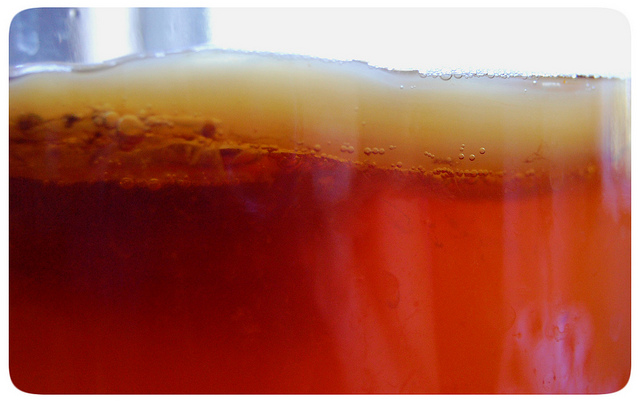Being a food fanatic comes with a lot of explaining. Between all the weird stuff I’ve experimented with and made, I’m surprised people still think I’m sane (maybe they don’t…) Anyways, food and nature are funny things and understanding the way food works is not always easy or appealing. Today, I’ll be talking about fermentation – one of my favorite things! For some reason people love the products of fermentation but don’t always appreciate the process of getting to that final product. Beer is a prime example. According to the Brewers Association, beer sales in the U.S. in 2015 was $105.9 billion and increasing every year. That’s a ton of money Americans spend on beer alone, when they could easily be making their own home-brews for much cheaper; but majority of American’s choose not to. Why is this? I suppose there are many theories that explain this and the main theory could be that of the same as the fast-food market, convenience. But another theory could be, ordinary people without cooking or chemistry knowledge, think they could never brew their own alcoholic beverage (which is totally false). I think many people are predisposed to think fermentation is some crazy voodoo process that somehow makes alcohol. But fermentation is actually a very simple and natural process. It’s seriously not weird ladies and gents, in fact, its fascinating.
What is Fermentation?
The simplest way to explain fermentation is, yeasts or bacteria converting sugar to alcohol, organic acids, and other gases. There I said it, bacteria and yeast. At this point, those two words may have people making a face, feeling skived out, and running for the hills. But if you want to develop a good relation with food and health, the first step is putting aside your negative inclinations of bacteria and yeast. Because look around you, there are so many delicious foods and beverages that wouldn’t be possible without these amazing microbes; cheese, bread, beer, wine, sake, sauerkraut, kimchi, yogurt, vodka, gin, tequila, cider, cocoa, miso, fish oil, soy sauce, sour cream, Tabasco, vinegar, the list goes on and on. In fact, aside from food products, YOU would not be alive if it weren’t for bacteria and yeast! If you don’t believe me read my post, Introduction to Probiotics. Now allow me to introduce one of my favorite fermented beverages, Kombucha.
What the heck is Kombucha?
Pronounced Kum-boo-cha, is essentially a fermented sweet tea that is a little sweet, a little vinegary, and bubbly from natural or forced carbonation (in most retail Kombuchas). Other names for Kombucha is mushroom tea, booch, fungus tea, elixir of life, and tea of immortality. The exact origin of Kombucha is unknown since there have been slight variations from country to country and time period to time period. I’ve read some literature saying it was first brewed in Japan, others say China, and some even say Russia. Either way, Kombucha has a long-lived history that has dated all the way back to dates BC, but became popular and commercially available in the U.S. in the 90’s. The most popular Kombucha drink on the market today is GT’s Kombucha also known as Synergy drinks.
All about the Culture aka SCOBY… huh?
Kombucha is traditionally brewed with sweet tea and a mother culture called a SCOBY. SCOBY stands for Symbiotic Colony Of Bacteria and Yeast. This colony of bacteria and yeast are suspended by a pale, slimy, and tough layer of cellulose, aka an indigestible linkage of sugar molecules very common in plants. Yes, I know this souunds totally  disgusting, but at the same time totally awesome! Think of the SCOBY as the instant dry yeast you would use to make bread. Without instant dry yeast your bread wouldn’t ferment, become active, or rise, and you’d end up with, well, not bread. The same idea stands for the SCOBY and your final product, Kombucha. Without the SCOBY all you’d have is a big batch of sweetened tea, which I guess could be good if you like sweet tea, but you’d be left with, well, not Kombucha. The SCOBY is often referred to as a mushroom, but there’s no mushrooms used in the brewing of Kombucha. Mushroom only refers to the look of the SCOBY because it sits on top of the sweet tea during the first fermentation process. Without a SCOBY, the sweet tea cannot be fermented into Kombucha so obtaining a SCOBY from a friend is the easiest option, but you can also purchase the culture online or make one yourself from store bought Kombucha.
disgusting, but at the same time totally awesome! Think of the SCOBY as the instant dry yeast you would use to make bread. Without instant dry yeast your bread wouldn’t ferment, become active, or rise, and you’d end up with, well, not bread. The same idea stands for the SCOBY and your final product, Kombucha. Without the SCOBY all you’d have is a big batch of sweetened tea, which I guess could be good if you like sweet tea, but you’d be left with, well, not Kombucha. The SCOBY is often referred to as a mushroom, but there’s no mushrooms used in the brewing of Kombucha. Mushroom only refers to the look of the SCOBY because it sits on top of the sweet tea during the first fermentation process. Without a SCOBY, the sweet tea cannot be fermented into Kombucha so obtaining a SCOBY from a friend is the easiest option, but you can also purchase the culture online or make one yourself from store bought Kombucha.
Health Benefits
The health benefits of Kombucha have been one long argument to another because of the very lack in research. Microbiology is a fairly young science and there’s so much that we don’t know at this point. It’s tough to study microbes and their efficacy on human health, so the health benefits of Kombucha are mostly whats been passed down from history, Chinese medicine, and personal experience. I’ll list some of my own experiences with drinking Kombucha, but again these are not claims, just personal experiences that thousands of other people around the world also experience from drinking Kombucha.
- The most popular health benefit is gut health. Kombucha contains healthy probiotic bacteria and enzymes that aid in digestion and help to maintain gut integrity.
- To go along with gut health, this stuff really gets your system moving (if you know what I’m talking about). Yes, it can relieve constipation and improve transit time, which can be a huge issue for many people.
- I’ve experienced a decrease in appetite after drinking Kombucha, I’m not exactly sure why, but this could be a pro for dieters.
- I often feel an increase in energy after drinking Kombucha and feel as if I can think faster and respond quicker in my day to day life.
- Antioxidants and polyphenols that are common in regular tea also pass on their health benefits in the Kombucha brew.
- Immune system health is a common benefit most people experience mostly attributed to the full circle of probiotics, enzymes, antioxidants, polyphenols, and organic acids found in Kombucha.
- Kombucha is a great alternative to soda! There is still some sugar content in Kombucha depending on the fermentation process, so Kombucha can slightly mimic the flavor profile of soda with its sweetness and carbonation; but obviously it’s much healthier and confers more health benefits than soda!
Precautions
Kombucha is generally recognized as safe and sold in retail locations as a pasturized non-alcoholic beverage meaning its ABV must be below 0.5%. Of course with the many health benefits, there are some dangers and precautions to drinking Kombucha. A very small majority of people will experience issues with drinking Kombucha, but again they are possible.
- Pregnant women, elderly, young children, and immune compromised individuals should avoid drinking home-brewed Kombucha if they never have before, because of the risk of contamination and bad bacteria in home brews.
- Home-brewers should take extra precautions when brewing Kombucha to make sure they are being sanitary, not cross-contaminating, and avoid any mold in their brews.
- First-time-drinkers should start to introduce Kombucha into their diet slowly, at about 4-8 ounces at a time.
- Drinking too much Kombucha all at once may give folks stomach upsets, gas, and even diarrhea. Although this is an unfavorable side effect, it can be explained by the introduction of new healthy bacteria in the gut that although safe, the body may not be used to. Once you start drinking Kombucha more regularly the gut will become immune to these new probiotic bacteria, realize they are not harmful, and actually start to colonize in your gut to confer health benefits. At this point the GI symptoms should subside.
- Kombucha is also pretty acidic, around 2.5-3.5, so drinking too much all at once could lead to an acidosis state where the bodies buffering system cannot keep up with the amount of acid being poured into it. This is obviously an extreme example, and you’d have to drink a lot of Kombucha, so it’s likely a rare case.
- Skin rashes are possible when drinking Kombucha possibly from an immune response that creates histamine when the body thinks there’s a foreign invader in the system, aka unknown bacteria from Kombucha. If this occurs stop drinking Kombucha for a short period of time and try introducing it again in even smaller doses. Again, this response usually subsides with time.
 Where can I get Kombucha?
Where can I get Kombucha?
Kombucha can easily be brewed at home or you can buy bottles of Kombucha in many retail locations including health food stores, grocery stores, some bars, and some cafes/restaurants. When I traveled to Colorado, there were many local  Kombucha breweries/bars that served their own Kombucha just like breweries serve beer. On the west coast, Kombucha is very much the health food craze that everyone is drinking and talking about. But on the east coast Kombucha hasn’t so much made its mark in storefronts… yet!
Kombucha breweries/bars that served their own Kombucha just like breweries serve beer. On the west coast, Kombucha is very much the health food craze that everyone is drinking and talking about. But on the east coast Kombucha hasn’t so much made its mark in storefronts… yet!
Why I love brewing Kombucha
Brewing Kombucha is far more than just producing a healthy drink. Brewing Kombucha gives me a sense of connection to my food and the natural wonders around me. To think a big slimy piece of cellulose could convert sugar in tea, to healthy organic acids that produce an awesome tasting drink is truly amazing to me. To think I would think a big slimy piece of cellulose was super cool is also truly amazing to me. Fermentation in general is astounding, but the community that surrounds the art of Kombucha brewing is so inviting, exciting, and fun. Brewing Kombucha gives me something to look forward to, something to constantly learn about (both by trial and error and researching), and something to constantly marvel. The accomplishment I feel when I’ve brewed a beautiful, balanced, and zippy brew that I can share with family and friends fills me with life, just like my drink is filled with life. If you’ve never brewed Kombucha and you’re interested in brewing please don’t be afraid, instead be curious! The Kombucha community is loving, inviting, and always willing to help any beginner make their first successful brew. There are many Kombucha and Fermentation groups/communities you can join on Facebook including:
Stay tuned for my next post, outlining the process of brewing Kombucha. I’ll throw in some of my own tips, experiences, troubleshooting issues, and of course tricks! Happy brewing!
